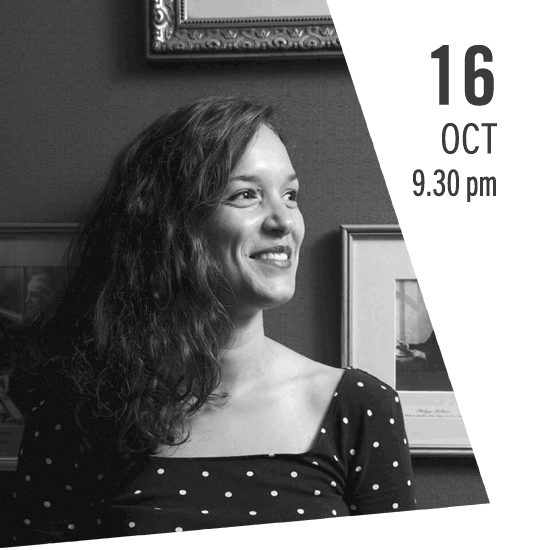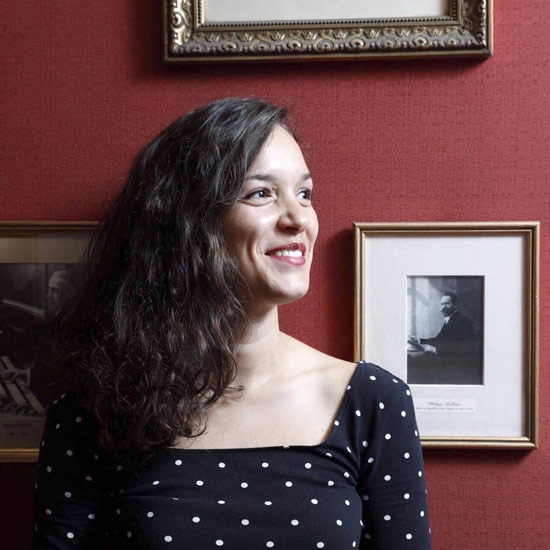 October 16, Monday, 9.30 pm;
October 16, Monday, 9.30 pm;
Igreja e Recolhimento do Bom Jesus · Funchal;
ORGAN AND SURPRISES
Loriane Llorca, organ;
Based around emblematic works of the Dutch and Italian schools from the end of the Renaissance and the beginning of the 17th century, this programme is full of musical surprises, such as the first pieces taken from the Faenza Codex, an Italian manuscript from the beginning of the 15th century, bringing together works of its time and also from the previous century. It contains the first works written for keyboard in the history of western music. Rarely played, because they are little-known, they are of great beauty. Elas Mon cuer is very smooth, with great freedom in its writing and very vocal musical contours, while Constantia is more rhythmical and closer to dance, all with very archaic harmonic colours and characteristics of that period. Other, improvised, surprises will give a more contemporary touch to this programme of early music. Textures and sound paintings invite the listener, on the basis of the music, to undertake a musical journey full of innovations. Old mechanical organs may be played in the traditional way, as may be heard in the pieces written for them, but these instruments have an unsuspected richness of timbres and techniques for contemporary creation. The technique and mechanism of these organs allow composition to proceed along new paths and experiment with sound waves in a completely different way. The pieces from the Dutch school in this programme are all built around a theme with variations. Thus, the first piece, Daphné, from the Suzanna Van Soldt’s manuscript, by an anonymous composer, presents a calm and gentle theme which becomes more intense as the piece contines. In the same way, the works by Samuel Scheidt, who was a pupil of Pieterzoon Sweelinck known as the “creator of organists” of his time, are variations on the Bergamasca, a well-known dance melody of the period, and on an English galliard. The influence of Seweelinck in these works is very clear and displays an organ school with a very strong identity. Finally, one of the most beautiful and emblematic works of Sweelinck closes the Dutch section of this programme. Frescobaldi, Italian composer and organist, published an immense collection Fiorimusicali, bringing together innumerable organ works: toccatas, canzone, ricercari, etc. Today we will hear a toccata for the elevation, very representative of Frescobaldi’s writing, with magnificent harmonies and dissonances. In comparison with Scheidt’s Bergamasca, this is the second version of this theme and variations in this concert, but this time from Frescobaldi’s pen and with Italian colours. During this period, composers travelled widely, bringing back influences from France, Spain, Portugal, Italy, the Netherlands and England. Thus, we always find some influences of the great masters of the time in their compositions. The last piece of the programme is a fantasy for organ by Andrea Gabrieli. Coming from a great famiy of Italian musicians, he left some four hundred works known today. This is often sacred vocal music which may be replaced by instruments. This very virtuosic Fantasiapor organo, contrapuntal in style, seems to imitate the writing and the musical contours found in polyphonic works for sackbuts.
Loriane Lorca
Program
ANONYM (Codex Faenza, c.1420)
Elas mon cuer (I)
Elas mon cuer (II)
Constantia
ANONYM (Manuscript Susanne Van Soldt, 1599)
Daphné
LORIANE LLORCA
Improvisation
SAMUEL SCHEIDT (1587-1654)
Bergamasca
Gaillarde englese
JAN PIETERSZOON SWEELINCK (1562-1621)
Mein junges Leben hat ein End
LORIANE LLORCA
Improvisation
GIROLAMO FRESCOBALDI (1583-1643)
Toccata per l’elevatione
Bergamasca
(Fiori musicali, 1636)
LORIANE LLORCA
Improvisation
ANDREA GABRIELI (1533-1585)
Fantasia allegra
 Loriane Llorca
Loriane Llorca
Loriane Llorca began her organ studies with Jesús Martín Moro at the Conservatoire of Pau. She continued her studies in Touloouse Michel Bouvard, Stéphane Bois and Jan Willem Jansen before beginning to attend the Higher National Conservatoire of Music and Dance in Paris in 2016, in the class of Olivier Latry and Michel Bouvard, where she graduated with masters degrees in organ and basso continuo. Afterwards, she worked with Peter Van Dijk at the Royal Conservatoire of Amsterdam. The holder of a degree in musicology from the Sorbonne, Loriane Llorca defends with conviction a vast repertoire from the renaissance to the first performances of contemporary works. She is currently developing a project dealing with the mediaeval portative organ. With the support of the Fondation de France-Ustaritz, the Meyer Foundation, the Tarrazi Foundation, Adami and the Société Générale e l'Or du Rhin, Loriane Llorca won, in 2017, the Grand Prix, as well as the Public Prize, of the Jean-Louis Florentz International Competition, under the auspices of the Academy of Beaux-Arts. Giving many concerts as a soloist and as part of various groups in France and abroad, she is also a regular guest of the Orchestra of Paris and the Paris Philarmonie for projects with organ.
